Give a round of applause to these green-leaning musicians, then cheer for your own favorites in the comments section at the bottom of the page.
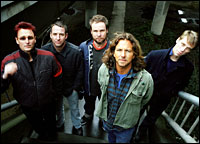
Pearl Jam
These down-to-earth rockers made headlines during their tour last year when they donated a total of $100,000 to nine organizations working on climate change, renewable energy, and other green causes. On their previous tour, the band donated funds to help preserve Madagascan rainforest. But looking in the rearview mirror, these grunge gods have always been committed to eco-causes — from staging benefit concerts to busing with biodiesel.
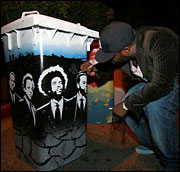
The Roots
This Grammy-winning hip-hop group certainly has strong roots in the environmental movement. As well as being fond of Organix, the band members are animal lovers, working with PETA on a campaign to “Stop the Violence: Go Veg.” The group also hosted a Pre-Grammy Jam & Green Carpet Bash this year, inviting fellow artists and friends to jam with them and raise awareness about green issues. As part of that event, they partnered with youth-focused green group Global Inheritance to promote composting by giving away specially designed and autographed compost bins.

Sarah Harmer
This Canadian singer-songwriter co-founded the environmental group PERL (Protecting Escarpment Rural Land), which is campaigning to prevent a proposed gravel development from harming the Niagara Escarpment, a wild area along the U.S.-Canadian border that includes Niagara Falls. Harmer walks the talk with her commitment to the cause — she hiked along the Escarpment with her acoustic band to play shows and raise awareness throughout the area, a tour documented in the film Escarpment Blues.
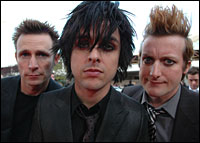
Green Day
Though eco-issues weren’t the inspiration for this pop-punk trio’s name, these guys are no American idiots when it comes to being green. They’ve partnered with the Natural Resources Defense Council on a Move America Beyond Oil campaign, and have made a number of YouTube videos voicing support for environmental protection and smarter energy policies.
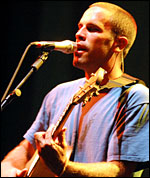
Jack Johnson
This Hawaiian-born singer-songwriter co-founded the Kokua Hawaii Foundation, a nonprofit supporting environmental education in the schools and communities of his home state. Johnson has also done a hula lot to offset the impact of his tours, opting for biodiesel-fueled buses, eco-friendly merchandise, and a partnership with 1% for the Planet.

Thom Yorke
This Radiohead frontman and, more recently, solo artist is a longtime vegan who has played a prominent role in Friends of the Earth’s Big Ask campaign, pushing the U.K. to adopt a strong law to fight global warming. Yorke says his solo album The Eraser was inspired by the climate crisis.
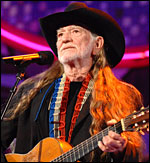
Willie Nelson
Green issues are always on his mind: This country singer is on the road again with his own line of alternative fuel: biodiesel that sells under the name BioWillie. His business model is “buy local, sell local,” a theme that echoes his work with Farm Aid, an organization he helped found more than 20 years ago to assist family farmers. Nelson has also been active in supporting the use of hemp in clothing and fuel, and protecting horses from slaughter.
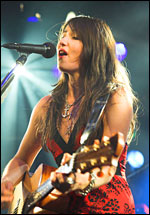
KT Tunstall
Grammy-nominated singer-songwriter KT Tunstall may have her Eye to the Telescope (suddenly, she sees!), but she’s also got her finger on the pulse of green goings-on. Tunstall ran her tour bus last fall on a biodiesel blend and plans to make her future eco-commitment even more drastic (fantastic!). Tunstall’s affiliation with The CarbonNeutral Company has enabled her and her fans to plant some 5,000 trees as offsets. She has also backed a “carbon diet” campaign by Global Cool, a group that brings entertainers and scientists together to fight global warming.
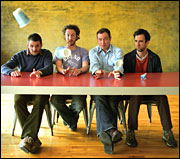
Guster
These folksy rockers have got gusto when it comes to green issues. For two years in a row, the band has ventured on a Campus Consciousness Tour, playing shows at colleges across the U.S. and educating students about biodiesel, chemical-free cosmetics, and organic food. The tours were organized by Reverb, a nonprofit founded by Guster guitarist/singer Adam Gardner and his wife Lauren Sullivan that helps artists like Barenaked Ladies, Alanis Morissette, Avril Lavigne, and others reach out to fans on environmental issues.
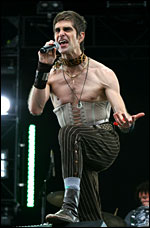
Perry Farrell
As lead singer for Jane’s Addiction, Farrell helped pioneer alternative rock, but more recently, through his work on the Lollapalooza festival, he’s helped pioneer the use of alternative fuel to power major music fests. In 2003, he planned to run one Lollapalooza stage on biodiesel, but ended up using the fuel to run the whole show; this year he’s planning even more eco-initiatives. Farrell has also helped put to music a previously unknown poem from Doors frontman Jim Morrison; the song, “Woman in the Window,” will be used as a theme for a global-warming campaign by Global Cool.

Sheryl Crow
When it comes to America’s environmental commitment, this bluesy rock singer-songwriter believes a change would do us good, so this spring she soaked up the sun with climate activist Laurie David on a Stop Global Warming College Tour. Making the point that the first emissions cut is the greenest, Crow spoke to students about easy ways to combat climate change, like using just one square of toilet paper — a joke (her favorite mistake?) that was later twisted by the media. Still, her eco-concerns will not fade away.

Barenaked Ladies
This pop-heavy quintet isn’t afraid to lay bare its environmental ethic. Partnering with Reverb to lessen the impact of their tours, BNL has taken care to ensure their backstage goings-on don’t counteract the message they’re sharing with fans. Lead singer Steven Page has long been vocal about his progressive views — from campaigning with Canada’s New Democratic Party to serving on the board of directors for World Wildlife Fund Canada.

Cloud Cult
This up-and-coming band out of Minnesota is unabashed about its environmental leanings. Lead singer Craig Minowa is an environmental scientist for the Organic Consumers Association and runs the nonprofit label Earthology Records, which is located on an organic farm and powered by geothermal and wind energy. The band records music in a small studio made from reclaimed scrap materials, and their CDs are packed in reused jewel cases (which they hand-clean!) and shrink-wrapped in environmentally benign LDPE plastic rather than the industry-standard toxic PVC. They also donate all profits after expenses to eco-charity efforts.

Bonnie Raitt
She may be a blues singer, but this fiery redhead is all green on the inside. Unafraid to give ’em something to talk about, Raitt helped to found Musicians United for Safe Energy, a group fighting the use of nuclear power, and has been arrested twice during protests on behalf of ancient forests. During her 2002 summer tour, Raitt initiated the Green Highway eco-village with interactive demos and information for her fans, a project that helped to inspire nonprofit Reverb to green other music tours.

Moby
This DJ-turned-pop-star’s entire musical style is about recycling — repurposing beats and riffs from other artists into tracks of his own. But Moby is much more deeply invested in green principles: After releasing a “best of” collection last fall, he decided to limit his touring to cut down on his environmental impact. A vegan, he’s a big supporter of PETA and the Humane Society, and in 2002 he opened Teany, a vegetarian tea café in New York City.
Green Music Festivals
Not only are musicians going green, but so are some of the top music festivals.

Photo: Sarah van Schagen
Bonnaroo
Held in June on farmland in rural Tennessee, this jam-band fest has been increasingly tuned in to green issues, setting up a “Planet Roo” area with info booths staffed by various environmental nonprofits, powering a stage with solar energy, and using biodiesel in non-music-stage generators. Festival maps and toilet paper are made from recycled materials; commemorative T-shirts are printed on organic cotton and hemp; and concession-stand plates, cups, and cutlery are compostable.

Photo: Cambria Harkey
Lollapalooza
Chicago’s Grant Park hosts this rock fest in early August, and this year, a new “Green Street” exhibit will feature eco-demos, sustainable merchandise, and a solar-powered stage. Vendors throughout the festival will be distributing their wares on compostable or biodegradable plates and in corn-based plastic bags. Any leftover food will be donated to a local food pantry, and construction materials will also be reused or recycled.

Photo: Dan Budiac via flickr
South by Southwest
During spring break each year (mid-March), some 1,500 bands say “yee-haw” to downtown Austin, Texas, for this three-day music festival and conference. This year, organizers purchased enough renewable-energy credits to offset not only the energy used at the many concert venues but also the energy used all year at the production offices. Additionally, biodiesel was used in some outdoor generators, a number of transit options were provided to reduce car trips, and a $5,000 donation was put toward local tree-planting efforts in Austin.

Photo: Casper Kongstein via flickr
Øyafestivalen
This four-day music fest is held in a park in Oslo, Norway, and organizers refuse to offer individual-car parking, instead encouraging festivalen-goers to come by rail or bus by offering discounts. All of the food served at Øya is certified “ecological” by a national agency, and dishware is composted. Recognizing how hard it is to green a big festival, Øya organizers have published an environmental handbook [ZIP file] with hints on finding green suppliers, managing waste, and dealing with bureaucracy.
Are these picks in tune or off key? Chime in with your own nominations in comments below.
Sarah van Schagen contributed to this list.

